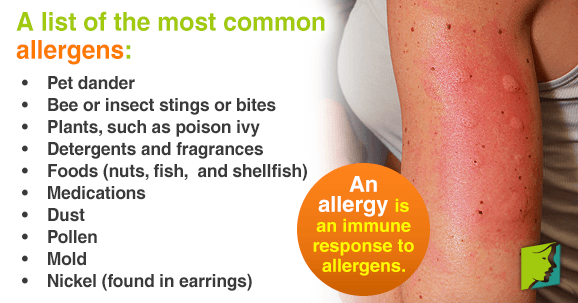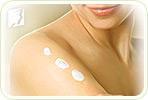The skin is the body's largest, and probably most underestimated organ. Among its many functions, it serves to keep all good things in and harmful substances out. On the other hand, an n allergy is an immune response to what it deems a suspicious or harmful substance - one that would normally be considered harmless. These substances are called allergens, and the body's oversensitive counter-reaction often manifests itself through itchy skin. Read on to learn more about how allergies affect the body.
About Allergies
Allergic reactions are developed for both environmental and genetic reasons, and are very common. For example, if your parents had allergies, you are much more likely to have them, too. They usually happen very soon after your body has come into contact with the allergen, but sometimes it may take a little time - up to a few hours or a whole day. It's possible that the first exposure to the substance won't cause any adverse reaction at all, but one might occur after multiple exposures - this is called becoming sensitized.
In many people, allergic reactions are mild and simply bothersome, but others have severe reactions. The worst of these is anaphylaxis, and if not treated immediately, can even lead to death within 15 minutes.
Here is a list of the most common allergens:
- Pet dander
- Bee or insect stings or bites
- Plants, such as poison ivy
- Detergents and fragrances
- Foods - especially nuts, fish, and shellfish
- Medications
- Dust
- Pollen
- Mold
- Nickel - commonly found in earrings
What Can I Do about Itchy Skin?
One of the most common symptoms of allergies is, undoubtedly, itchy skin. Itching can be felt in a particular spot on the body or all over. In those with mild reactions, allergic itching can also be accompanied by hives, nasal congestion, rashes, or red and watery eyes. Severe reactions often cause even more disruptive symptoms.
During the body's immune response to an allergen, chemicals called histamines are released. Naturally, over-the-counter antihistamines are usually effective and fast-acting in getting to the source of the allergic reaction and calming the symptoms.
In the meantime, here are some other ideas to help you find relief from itchy skin:
- Avoid scratching the itchy areas as much as possible
- Wear cool, light, loose pajamas, and avoid rough clothing
- Take lukewarm baths using little soap and rinse well
- Use a soothing lotion to soften and cool the skin
- Apply a cold compress to the itchy area
- Avoid excessive heat and humidity, which aggravate itching
- Try over-the-counter hydrocortisone cream
Each person will experience an allergy differently, and it's important to take care when involved in situations where your risk of exposure is higher, and when searching for treatments. Fortunately, there are plenty of options for relief when it comes to the allergies that cause itchy skin. Soon, your skin could be smooth and calm once again. Read complete information on treatments for itchy skin.
Sources
- Henochowicz, S. (2015). Allergic Reactions. Retrieved January 23, 2015, from http://www.nlm.nih.gov/medlineplus/ency/article/000005.htm
- Vorvick, L. (2012). Itching. Retrieved January 23, 2015, from http://www.nlm.nih.gov/medlineplus/ency/article/003217.htm




